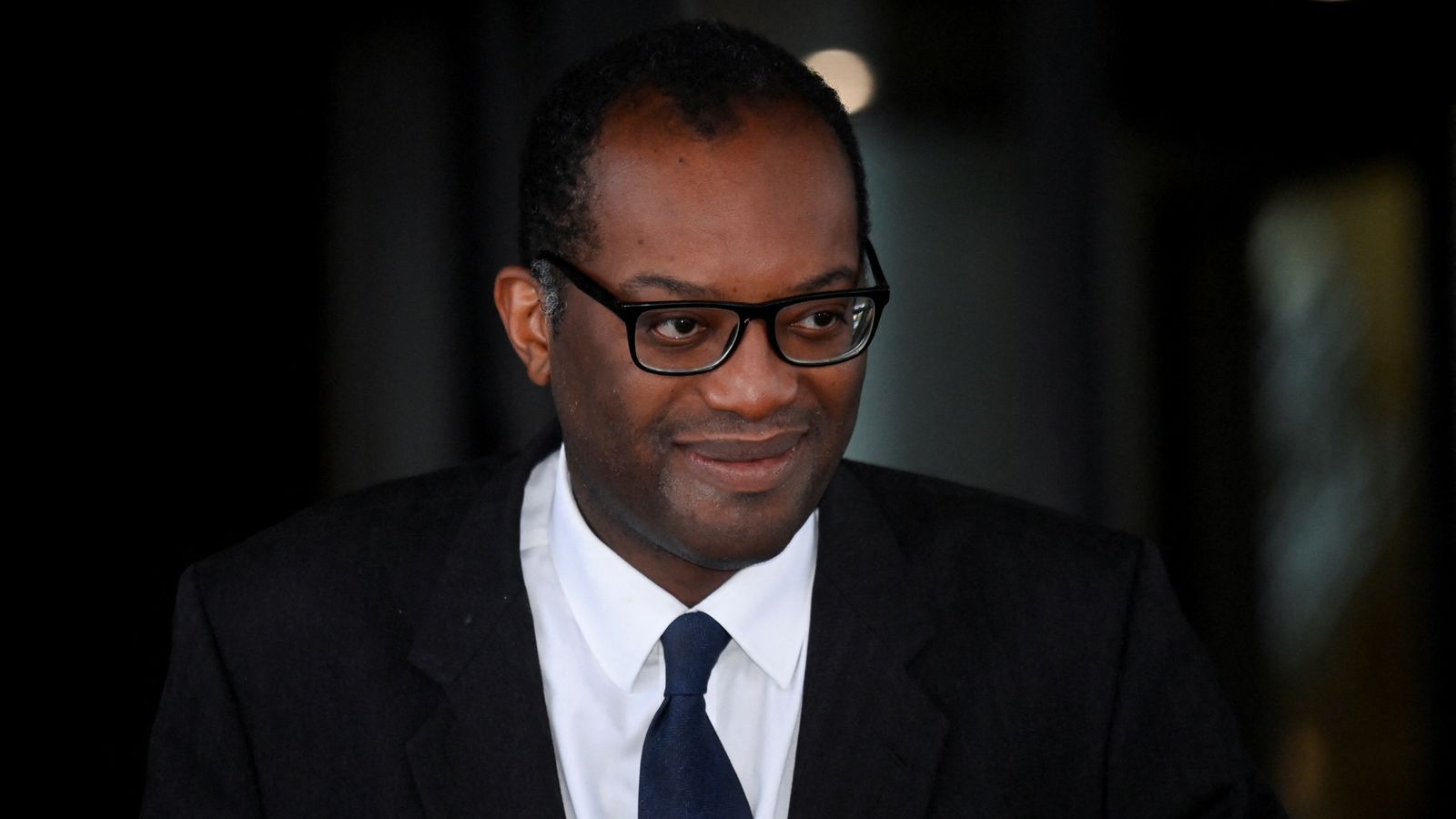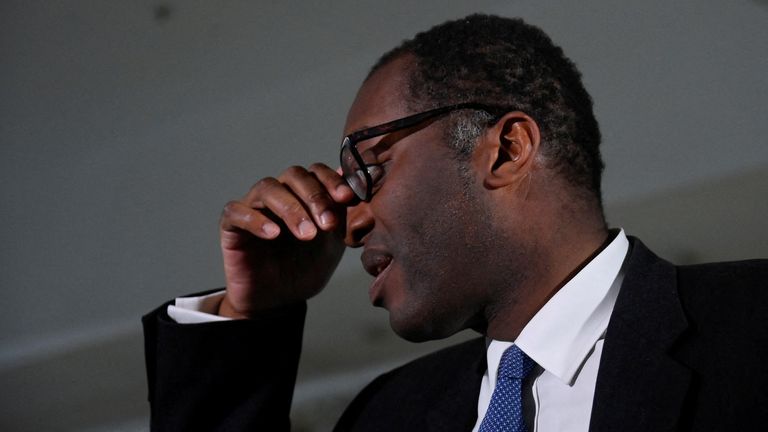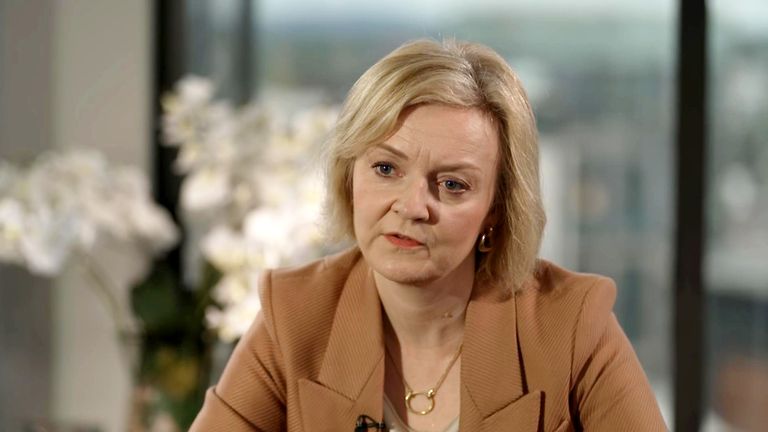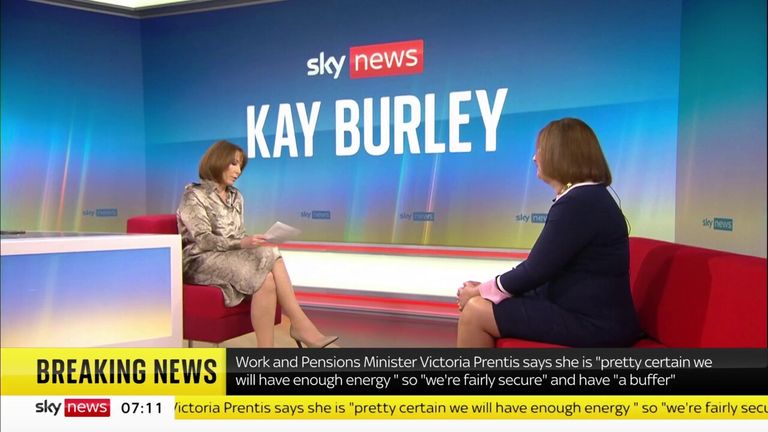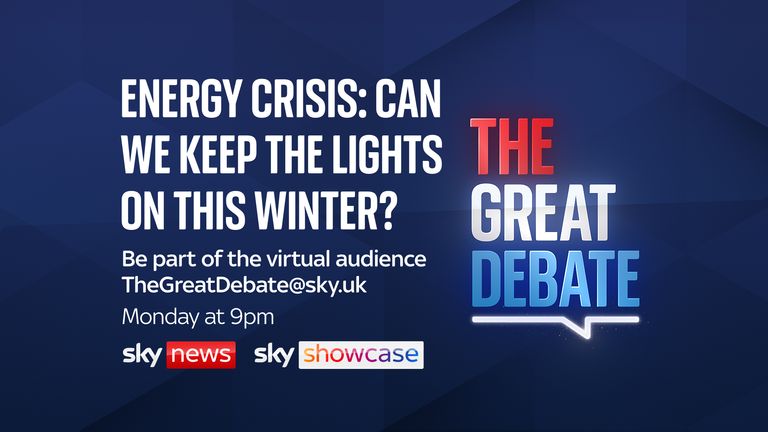Chancellor Kwasi Kwarteng’s debt-cutting plan will be published on 31 October – three weeks earlier than planned – alongside an independent economic forecast, the Treasury has confirmed.
Both the publication of the medium-term financial plan and the forecast by the Office for Budget Responsibility (OBR) had been due on 23 November, but the chancellor has bowed to pressure to bring this date forward to Halloween.
Financial markets responded badly to the chancellor’s mini-budget last month, with the pound falling to a record low.
Mr Kwarteng has been facing growing calls to produce his fiscal statement which will outline how the government intends to pay for the £43bn worth of tax cuts in the mini-budget and how it plans to reduce debt.
Sunak ally welcomes ministerial appointment – Politics latest
Writing to Treasury Select Committee Chairman Mel Stride, Mr Kwarteng said: “I have previously written to inform you that an economic and fiscal forecast will be published alongside the Medium-Term Fiscal Plan on 23 November. I have decided to bring this date forward to 31 October.”
The chancellor said the revised date “will allow for a full forecast process to take place to a standard that satisfies the legal requirements of the Charter for Budget Responsibility” which “provides an in-depth assessment of the economy and public finances”.
He added: “And it will provide time for the Medium-Term Fiscal Plan to be finalised.”
Click to subscribe to the Sophy Ridge on Sunday podcast
The chancellor’s fiscal statement will now be published prior to the Bank of England announcing its latest decision on interest rates on 3 November.
Responding to the chancellor’s letter, Mr Stride welcomed the move, saying the publication of both the government’s debt-cutting plan and independent economic forecast on 31 October may result in a smaller rise in interest rates which is “critical to millions” of mortgage holders.
Former cabinet minister Grant Shapps called it a “belated but sensible move”.
The SNP’s Pete Wishart warned Prime Minister Liz Truss and Mr Kwarteng “must abandon their Tory Halloween horror show plans to impose £18billion cuts to social security payments and public services, including our NHS”.
What was in the chancellor’s mini-budget?
The key points from Mr Kwarteng’s mini-budget statement to MPs at the end of September were:
• The basic rate of income tax will be cut to 19p in the pound from April 2023
• The 45% higher rate of income tax is to be abolished
• Planned duty rises on beer, cider, wine and spirits cancelled
• Stamp duty to be cut. Nothing will be paid for first £250,000 of property’s value – double the current amount allowed. The threshold for first-time buyers is to be increased from £300,000 to £425,000
• Household bills to be cut by an expected £1,000 this year with aid from energy price guarantee and £400 grant
• Cap on bankers’ bonuses is to be scrapped as part of efforts to “reaffirm” the UK’s status as a financial services hub
• Planned rise in corporation tax to 25% next year is cancelled
However, a few days after announcing the tax-cutting mini-budget, Mr Kwarteng confirmed the government was axing plans to give the wealthiest 1% a tax cut following a bitter backlash from Tory MPs.
The plan to scrap the 45p rate, which is paid by people who earn over £150,000 a year, was criticised as unfair amid the cost of living crisis.
Truss faces growing pressure over benefits
Mr Kwarteng said in a tweet that the measure had become a “distraction” from his objective to grow the economy.
He said: “We get it, we have listened.”
Read more:
Bank chief economist rebukes government defence of market turmoil
Adam Boulton on economic crisis
Meanwhile, Ms Truss is facing mounting pressure from within the Conservative Party to raise benefits in line with inflation.
Former chancellor Sajid Javid added his voice to growing opposition to proposals to increase payments by less than inflation on Monday.
House of Commons Leader Penny Mordaunt became the first cabinet minister to openly oppose the idea of not uprating benefits with inflation last week, telling Times Radio: “I’ve always supported – whether it’s pensions, whether it’s our welfare system – keeping pace with inflation. It makes sense to do so. That’s what I voted for before.”
Speaking to broadcasters in Birmingham where the Conservative Party’s conference took place last week, the prime minister said she had “not made a decision” on whether to stick to the benefit uprate promised by her predecessor Boris Johnson.
“I’m very clear that going into this winter, we do need to help the most vulnerable,” Ms Truss added.
Each percentage point rise in benefits adds £1.6bn to welfare spend
It is understood that Downing Street is considering increasing Universal Credit using a lower metric, such as the increase in average earnings, instead of inflation.
Benefits are usually uprated in line with the consumer price index (CPI) rate of inflation from September, with the rise coming into effect the following April.
The Institute for Fiscal Studies estimates that each percentage point rise in CPI adds £1.6bn to welfare spending.
Baroness Stroud, who worked under former work and pensions secretary Sir Iain Duncan Smith on welfare and is now at the Legatum Institute, has warned failure to raise benefits in line with inflation would push 450,000 people into poverty next year.
Earlier today, a department for work and pensions minister told Sky News Ms Truss is expected to make a decision on whether to uprate benefits in line with inflation in November.
PM to launch charm offensive with Tory MPs
Victoria Prentis said “no decision has been taken about the uprating of benefits” but that she is sure that the government will “make that decision as quickly as possible”.
A Downing Street source said that the prime minister can see both sides of the debate and remains “genuinely undecided” on the matter.
The source added that Ms Truss will be “listening to cabinet and colleagues” before a stance is taken.
Meanwhile, the PM is set to launch a charm offensive this week to bridge the divide within her party over the mini-budget.
As MPs file back into Westminster, the PM is expected to hold policy lunches with groups of colleagues and address the 1922 Committee of backbench Conservative MPs on Wednesday.

